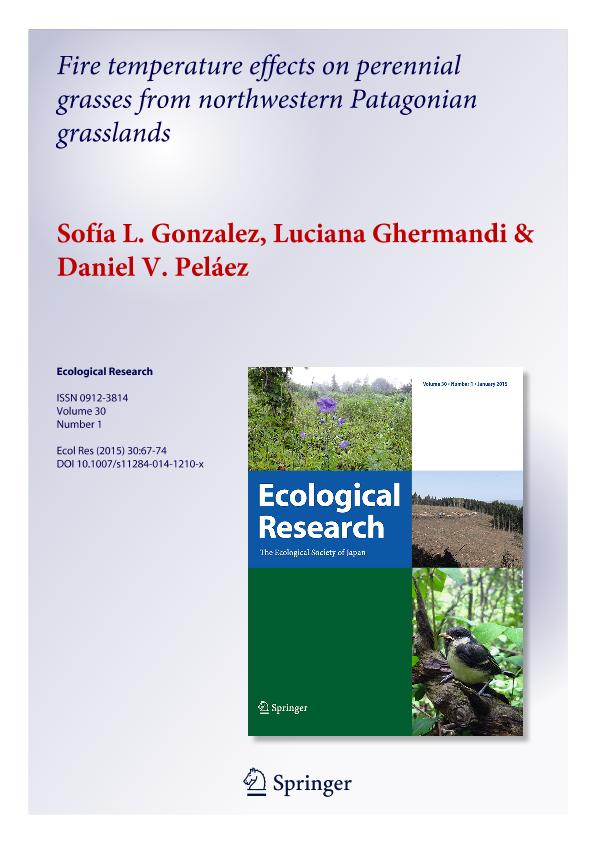Mostrar el registro sencillo del ítem
dc.contributor.author
Gonzalez, Sofia Laura

dc.contributor.author
Ghermandi, Luciana

dc.contributor.author
Pelaez, Daniel V.
dc.date.available
2017-01-26T20:49:10Z
dc.date.issued
2015-01
dc.identifier.citation
Gonzalez, Sofia Laura; Ghermandi, Luciana; Pelaez, Daniel V.; Fire temperature effects on perennial grasses from northwestern Patagonian grasslands; Springer Tokyo; Ecological Research; 30; 1; 1-2015; 67-74
dc.identifier.issn
0912-3814
dc.identifier.uri
http://hdl.handle.net/11336/12042
dc.description.abstract
Post-fire recovery of perennial plants depends on their capacity to regrow from surviving meristems. Plants are adapted to a particular fire regime, which can be altered by human activities and climatic change. Therefore, predicting the impact of changing fire regimes on post-fire vegetation recovery has become a major ecological concern. We studied the effects of fire temperature on survival and growth of the dominant tussock grasses Festuca pallescens and Pappostipa speciosa for two post-fire growing seasons in NW Patagonian grasslands. Using a portable propane burner, we applied two fire temperature treatments to individual plants: 200–500 °C (low temperature) and 500–900 °C (high temperature). Plant mortality was higher in F. pallescens than in P. speciosa, possibly due to morphological differences. Fire damaged active meristems in both species, which delayed emergence of new tillers. This in turn affected leaf length of tillers, which was lower in burned plants during the first growing season. Despite this, growth rate was higher in burned plants once they regrow only during the first growing season. In summer, post-fire hot and dry conditions affected F. pallescens survival. Although fire temperature affected negatively F. pallescens survival, both tussock grasses recovered quickly after the experimental burns. This response could favour their persistence and dominance in the community. Our study increases understanding of post-fire responses in grasslands and will provide important rangeland management information for grasslands in Patagonia.
dc.format
application/pdf
dc.language.iso
eng
dc.publisher
Springer Tokyo

dc.rights
info:eu-repo/semantics/openAccess
dc.rights.uri
https://creativecommons.org/licenses/by-nc-sa/2.5/ar/
dc.subject
Climate Change
dc.subject
Fire Intensity
dc.subject
Fire Regime
dc.subject
Tussock Grasses
dc.subject.classification
Otras Ciencias Agrícolas

dc.subject.classification
Otras Ciencias Agrícolas

dc.subject.classification
CIENCIAS AGRÍCOLAS

dc.title
Fire temperature effects on perennial grasses from northwestern Patagonian grasslands
dc.type
info:eu-repo/semantics/article
dc.type
info:ar-repo/semantics/artículo
dc.type
info:eu-repo/semantics/publishedVersion
dc.date.updated
2016-12-12T14:29:14Z
dc.identifier.eissn
1440-1703
dc.journal.volume
30
dc.journal.number
1
dc.journal.pagination
67-74
dc.journal.pais
Japón

dc.journal.ciudad
Tokyo
dc.description.fil
Fil: Gonzalez, Sofia Laura. Consejo Nacional de Investigaciones Científicas y Técnicas. Centro Científico Tecnológico Patagonia Norte. Instituto de Investigación En Biodiversidad y Medioambiente; Argentina. Universidad Nacional del Comahue; Argentina
dc.description.fil
Fil: Ghermandi, Luciana. Consejo Nacional de Investigaciones Científicas y Técnicas. Centro Científico Tecnológico Patagonia Norte. Instituto de Investigación En Biodiversidad y Medioambiente; Argentina. Universidad Nacional del Comahue; Argentina
dc.description.fil
Fil: Pelaez, Daniel V.. Consejo Nacional de Investigaciones Científicas y Técnicas. Centro Científico Tecnológico Bahía Blanca. Centro de Recursos Naturales Renovables de la Zona Semiárida(i); Argentina. Provincia de Buenos Aires. Gobernación. Comisión de Investigaciones Científicas; Argentina. Universidad Nacional del Sur; Argentina
dc.journal.title
Ecological Research

dc.relation.alternativeid
info:eu-repo/semantics/altIdentifier/doi/http://dx.doi.org/10.1007/s11284-014-1210-x
dc.relation.alternativeid
info:eu-repo/semantics/altIdentifier/url/http://link.springer.com/article/10.1007%2Fs11284-014-1210-x
Archivos asociados
